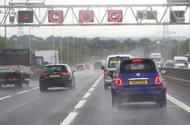Truss previously advocated for increasing the speed limit to 80mph
Front-runner for next PM considers removal of speed limits; smart motorways on chopping block
Liz Truss, current front-runner to be the next UK prime minister, has confirmed that she would consider a review of – and potential end to – speed limits on motorways.
Replying to an audience question at the final debate before the deadline for Conservative party members to vote for their next leader (and thus the new prime minister), Truss said she is “prepared to look at” scrapping limits.
A total removal of speed limits would take the UK’s motorway network a step further than Germany’s autobahn network, which is only derestricted in places. For those sections, an advisory limit of 130km/h (81mph) is in effect and drivers who cause an incident by exceeding this face legal consequences.
However, Truss added that she couldn’t give “a precise answer” on the policy yet. In 2018, she advocated an increase in speed limits to 80mph to boost the nation’s productivity.
Regardless of who wins the leadership election, smart motorways are likely to be axed. Truss said: “We need to review [smart motorways] and stop them if they’re not working as soon as possible.”
This mirrors leadership rival Rishi Sunak’s earlier statement that “smart motorways are unpopular because they are unsafe” and that the government needs to “stop with the pursuit of policies that go against common sense”.
Smart motorways, which have removed permanent hard shoulders on almost 500 miles of the UK’s road network, have proven controversial due to safety concerns. The number of fatal incidents involving stopped vehicles on smart motorways has been shown to be significantly higher than on conventional motorways.
According to a National Highways report published in May, deaths or serious injuries caused by collisions with stopped vehicles on conventional motorways occured at a rate of 0.09 victims per 100 million miles driven between 2016 and 2020. On all-lane-running smart motorways without a hard shoulder, this was more than double, at 0.19.
In January, the government announced it will not build any more smart motorways until it has five years of safety data available for those built prior to 2020. This came in response to a November 2021 recommendation from the House of Commons Transport Select Committee, which said dynamic hard shoulders “apparently confuse drivers”.
The Conservative party will announce its new leader on 5 September.
Source: Autocar
